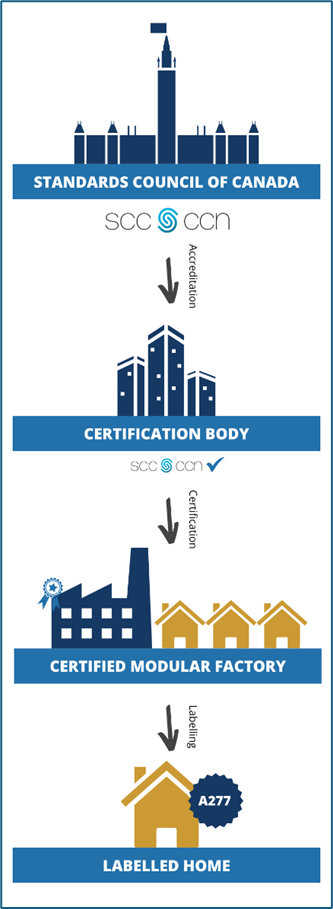Member KNOWLEDGE CENTER
 member Knowledge center
member Knowledge center
The Knowledge Centre provides CHBA members with access to information and resources. It is a growing resource that is currently focused on updating members about national building code information. Please note that this information is a benefit of your membership, and should not be shared beyond your company/organization.
You can browse the items below, filter by category, or enter search terms in the "What are you looking for" box below.
Code Compliance for Modular Buildings

Code Compliance for Modular Buildings
March 28, 2025
 Code Compliance for Modular Buildings
Code Compliance for Modular Buildings
In a nutshell here is how it works: Modular buildings must adhere to the National Building Code (NBC) and local building codes – the same as site-built structures. The NBC allows off-site reviews for factory-built components. The certification of the factory process to the CSA A277 standard procedure ensures off-site compliance and eliminates the need for re-inspection of factory-built components. Site work (e.g., foundations, connections) still requires local inspections.
Here’s how code compliance is ensured for modular buildings in Canada.

Accreditation of Certification Bodies
The Standards Council of Canada certification bodies for specific scopes.
Factory certification can be carried out by accredited bodies such as QAI, CSA, or Intertek.
Certification Bodies Audit Factories
Certification bodies audit factories annually and conduct random inspections quarterly.
They verify adherence to a factory’s quality assurance program, which includes personnel qualifications, process checklists, and record-keeping.
Factory Certification means Quality Assurance
The CSA A277 standard governs the certification of modular buildings.
Certification of a modular factory ensures that factory-built components comply with applicable, local codes and regulations.
All inspections for factory-built components occur during the manufacturing process, covering structural, plumbing, and electrical systems.
Certified factories maintain meticulous documentation, including travel logs and serial numbers for each unit for a minimum of 5 years.
Traceability through Specification Plate
Every modular building has a serial number and includes a specification sheet attached to the electrical panel.
This sheet lists design loads (e.g., wind, snow, seismic), confirms compliance with energy efficiency and local climate requirements and provides key details for inspectors and building owners.
Provincial and Territorial Code Requirements for Modular Homes
While all local authorities determine final compliance requirements for on-site works, the equivalency of factory construction and permission to use in-factory inspections is managed differently in each provincial/territorial code:
- Mandatory Certification: Alberta, Quebec, Yukon.
- Recognized Certification: Provincial building codes in Ontario, British Columbia, and New Brunswick accept CSA A277 certification as evidence of compliance.
- National Building Code: permits in-factory inspections without mandating certification.
Testing, Quality Assurance and Documentation
Besides in-factory checklists, factory-inspections typically include
- Plumbing Tests: Rough-in and Drainage, Waste and Vent test of air and water pressure.
- Moisture Content: Random checks on lumber to ensure acceptable moisture content.
- Electrical Tests: Insulation resistance and operational tests to verify integrity.
- Structural Integrity: Deformation resistance tests to meet transport requirements and local, climate load requirements.
Documentation includes travel log, factory checklists, completed tests, serial number and shipping documentation. Any change orders are documented and must follow proper process to ensure they are properly implemented and all documentation for each constructed unit is stored digitally along with original copies for a minimum of 5 years.
Some Benefits of Modular Construction
- Efficiency: Because in-factory certification reduces on-site inspection requirements and site construction can happen in parallel with the building construction, modular construction saves time and can shorten the combined time final delivery by up to 50%.
- Environmental Advantages: Factory construction minimizes waste and site disruption and provides ideal conditions during construction which improves durability of materials.
- Resilience: Enhanced structural strength to meet transportation demands offers superior wind resistance once installed on site. Off-site construction can be an effective resilience measure during and immediately after extreme climate events.
This information is provided by CHBA for informational purposes only and cannot be used as an official or authoritative document.
The content of this document does not necessarily reflect the views and policies of the Canadian Home Builders’ Association.
The mention of trade names and commercial products does not constitute a recommendation or endorsement of use.
Additional Info
Download File : Tech Essentials Code Compliance for Modular 2025-03-28.pdf
